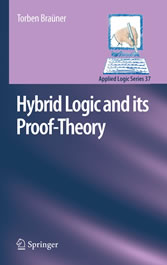Suchen und Finden
Preface
6
Contents
11
1 Introduction to Hybrid Logic
14
1.1 Informal Motivation
14
1.2 Formal Syntax and Semantics
18
1.2.1 Translation into First-Order Logic
20
1.3 The Origin of Hybrid Logic in Prior's Work
23
1.3.1 Did Prior Reach His Philosophical Goal?
27
1.4 The Development Since Prior
29
2 Proof-Theory of Propositional Hybrid Logic
34
2.1 The Basics of Natural Deduction Systems
34
2.2 Natural Deduction for Propositional Hybrid Logic
38
2.2.1 Conditions on the Accessibility Relation
41
2.2.2 Some Admissible Rules
43
2.2.3 Soundness and Completeness
45
2.2.4 Normalization
50
2.2.5 The Form of Normal Derivations
56
2.2.6 Discussion
59
2.3 The Basics of Gentzen Systems
61
2.4 Gentzen Systems for Propositional Hybrid Logic
63
2.4.1 Soundness and Completeness
64
2.4.2 The Form of Derivations
66
2.4.3 Discussion
66
2.5 Axiom Systems for Propositional Hybrid Logic
67
2.5.1 Soundness and Completeness
69
2.5.2 Discussion
70
3 Tableaus and Decision Procedures for Hybrid Logic
71
3.1 The Basics of Tableau Systems
71
3.2 A tableau System Including the Universal Modality
74
3.2.1 Tableau Rules for Hybrid Logic
74
3.2.2 Some Properties of the Tableau System
76
3.2.3 Systematic Tableau Construction
78
3.2.4 The Model Existence Theorem and Decidability
80
3.2.5 Tableau Examples
83
3.3 A Tableau System Not Including the Universal Modality
88
3.3.1 A Hybrid-Logical Version of Analytic Cuts
92
3.4 The Tableau Systems Reformulated as Gentzen Systems
95
3.5 Discussion
100
4 Comparison to Seligman's Natural Deduction System
103
4.1 The Natural Deduction Systems Under Consideration
103
4.1.1 Seligman's Original System
105
4.2 Translation from Seligman-Style Derivations
107
4.3 Translation to Seligman-Style Derivations
109
4.4 Reduction Rules
113
4.5 Discussion
118
5 Functional Completeness for a Hybrid Logic
120
5.1 The Natural Deduction System Under Consideration
120
5.2 Introduction to Functional Completeness
123
5.3 The General Rule Schemas
124
5.3.1 Earlier Work on Functional Completeness
124
5.3.2 Rule Schemas for Hybrid Logic
128
5.3.3 Normalization and Conservativity
130
5.4 Functional Completeness
132
5.5 Discussion
136
6 First-Order Hybrid Logic
138
6.1 Introduction to First-Order Hybrid Logic
138
6.1.1 Some Remarks on Existence and Quantification
142
6.1.2 Rigidified Constants
143
6.1.3 Translation into Two-Sorted First-Order Logic
146
6.2 Natural Deduction for First-Order Hybrid Logic
149
6.2.1 Conditions on the Accessibility Relation
150
6.2.2 Some Admissible Rules
153
6.2.3 Soundness and Completeness
154
6.2.4 Normalization
158
6.2.5 The Form of Normal Derivations
160
6.3 Axiom Systems for First-Order Hybrid Logic
161
7 Intensional First-Order Hybrid Logic
164
7.1 Introduction to Intensional First-Order Hybrid Logic
164
7.1.1 Generalized Models
168
7.1.2 Translation into Three-Sorted First-Order Logic
171
7.2 Natural Deduction for Intensional First-Order Hybrid Logic
174
7.2.1 Soundness and Completeness: Generalized Models
175
7.2.2 Soundness and Completeness: Standard Models
177
7.3 Partial Intensions
179
8 Intuitionistic Hybrid Logic
181
8.1 Introduction to Intuitionistic Hybrid Logic
181
8.1.1 Relation to Many-Valued Semantics
185
8.1.2 Relation to Birelational Semantics
187
8.1.3 Translation into Intuitionistic First-Order Logic
188
8.2 Natural Deduction for Intuitionistic Hybrid Logic
190
8.2.1 Conditions on the Accessibility Relation
190
8.2.2 An Admissible Rule
193
8.2.3 Soundness and Completeness
193
8.2.4 Normalization
196
8.2.5 The Form of Normal Derivations
201
8.3 Axiom Systems for Intuitionistic Hybrid Logic
204
8.4 Axiom Systems for a Paraconsistent Hybrid Logic
205
8.4.1 Soundness and Completeness
208
8.5 A Curry-Howard Interpretation of Intuitionistic Hybrid Logic
210
9 Labelled Versus Internalized Natural Deduction
212
9.1 A Labelled Natural Deduction System for Modal Logic
212
9.2 The Internalization Translation
213
9.3 Reductions
214
9.4 Comparison of Reductions
216
9.4.1 A Remark on Normalization
218
10 Why Does the Proof-Theory of Hybrid Logic Behave So Well?
220
10.1 The Success Criteria
220
10.1.1 Standard Systems for Modal Logic
222
10.1.2 Labelled Systems for Modal Logic
222
10.2 Why Hybrid-Logical Proof-Theory Behaves So Well
223
10.3 Comparison to Internalization of Bivalent Semantics
226
10.4 Some Concluding Philosophical Remarks
228
References
230
Index
238
Alle Preise verstehen sich inklusive der gesetzlichen MwSt.








